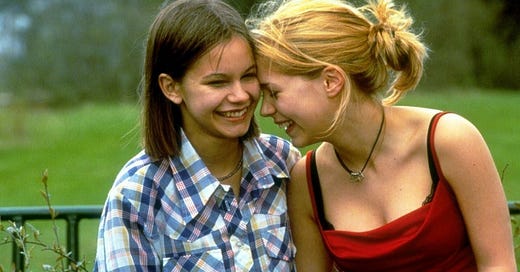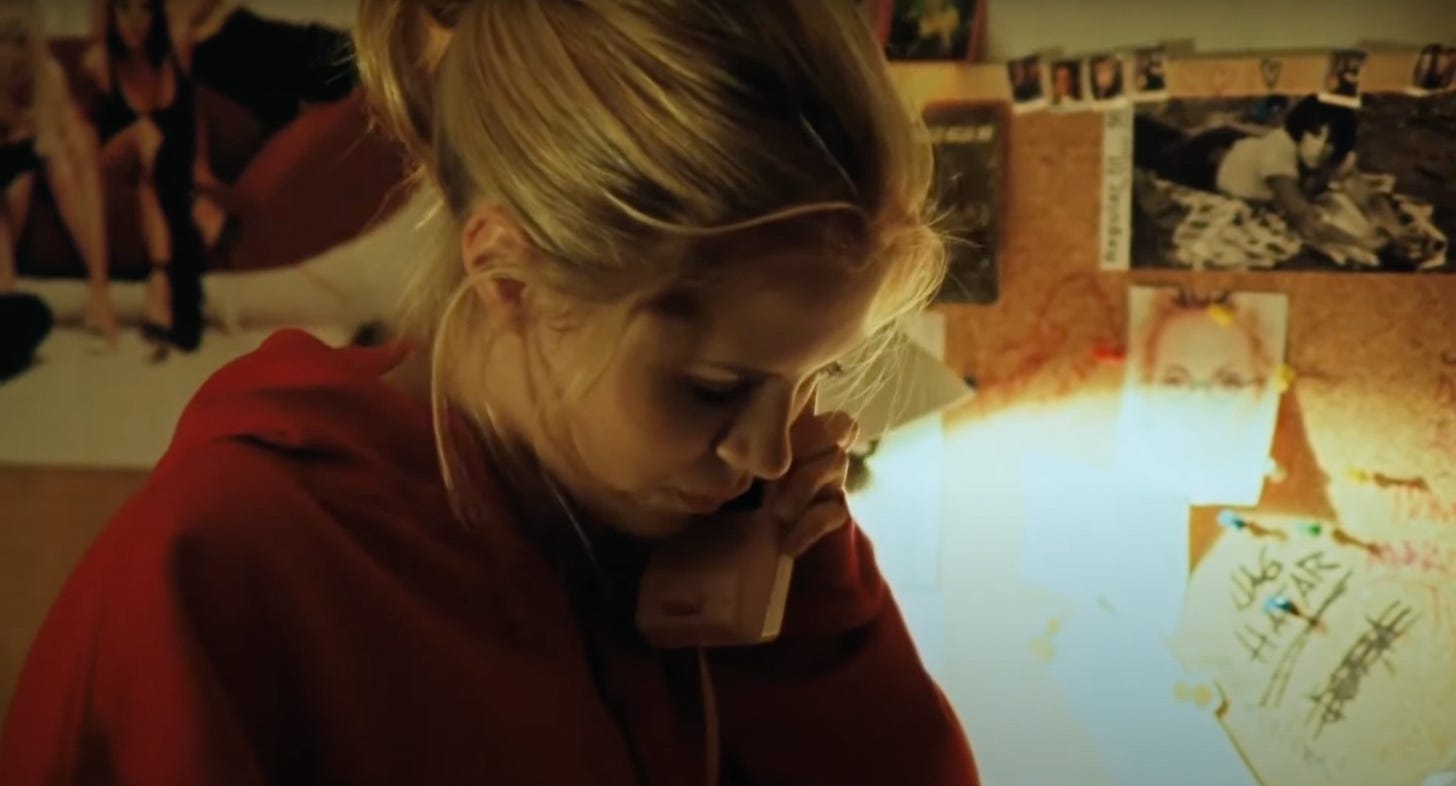Lukas Moodysson is best known as a pessimistic filmmaker (there is not much to be optimistic about in 2002’s Lilya 4-ever), but what makes his 1998 feature length debut Fucking Åmål (English title Show Me Love, which inspired the t.A.t.u. song) so commanding is the rosy future it paints for lesbian teenage protagonists Agnes (Rebecka Liljeberg) and Elin (Alexandra Dahlström) in the final ten minutes of the film. What makes the ending so cathartic and unpredictable for the audience is the fact that it does not match the darker tone of most of the film, which is more akin to Moodysson’s later penchant for pessimism. It would have been easy, especially for Moodysson, to end the film on a bleak note, but it’s so much more rewarding for the audience to be cheering for Agnes and Elin as they exit the bathroom stall together, hand in hand. If anyone has earned a happy ending, it’s them.
Let me start at the beginning– Agnes is the weird, depressed outcast, while Elin is popular and bubbly, but dissatisfied with her “boring” life in small town Åmål. Tedious, stupid, fucking Åmål. Can I make it any more obvious? Agnes is in love with Elin, but is too shy to make a move. Elin isn’t quite sure how she feels about Agnes, and her internal struggle to uncover her sexuality is the thrust of the film. At 14 years old, Elin already has a reputation as a slut, even though she’s a child, and still a virgin; she’s made out with some guys, more because she wants something to take her mind off her suburban boredom than any actual interest in the guys.
Agnes is the only one who is able to match Elin’s heightened spontaneity that borders on insanity. When Elin suggests the two go hitchhiking to Stockholm, she expects Agnes to refuse, but when a car actually pulls up, Elin balks, and Agnes hops straight in. Agnes is the one who instinctively comes up with a quick lie to tell the driver, about how they were staying with their aunt and spent their train money at the record store, Elin watching nervously on the sidelines. Elin is so impressed that she kisses Agnes in the backseat; cue the greatest I Want to Know What Love Is needle drop in cinematic history. It’s short lived– the driver catches them smooching and kicks them out. Elin promises to call Agnes, but can’t quite figure out how to confess to her sister Jessica (Erica Carlson) that she likes a girl, so she breaks her promise.
The teenagers Moodysson depicts are mindlessly cruel, not excluding Agnes and Elin. The popular girls, Elin’s so-called friends, mercilessly pick on Agnes, even though she honestly seems like a pretty normal kid, if a little shy. Elin cruelly toys with Agnes for a lot of the film, as she is having difficulty figuring out her sexuality, and in turn, Agnes takes her anger out on a girl in a wheelchair, who in turn, spreads homophobic rumors about Agnes to everyone at school. When we are introduced to Elin, she is physically fighting with her older sister Jessica over who drank the last of the chocolate milk; the sisters have a tight relationship, but they argue a lot, and Jessica could stand to be better at defending her sister, especially since she’s the older one. Jessica’s boyfriend Markus (Stefan Hörberg) is a tough guy who gets in drunken fights when other guys look at Jessica wrong, and makes casually sexist comments to the sisters about how the only thing women can understand is vanity.
Not only are they all cruel, but they’re also all sex obsessed. They’re teens, what did you expect? What’s more important is that they’re obsessed with sex in a real way, not a glossy Euphoria (or even Glee) way; through a more documentary style of filmmaking, Moodysson created a more raw testimony of teen sexuality, not a Vogue (or in Glee’s case, Cosmopolitan) cover spread. All that these kids talk about is which guy is hooking up with which girl, which is true to life; it never occurs to any of the teens in the Greek chorus pounding on the bathroom stall at the end of the film that Elin might be in there with another girl. The nicest of the teens is Johan (Mathias Rust), who is also in love with Elin, despite her previously mentioned notoriety as a hussy; but he’s a teen boy, so I’ll give you one guess as to what’s on his mind, especially once everyone is drunk.
To throw dust in everyone’s eyes regarding her true feelings for Agnes, Elin dates Johan, and even hands over her V card, but she ultimately breaks up with him over the phone in a hilarious scene (maybe because the sex with him wasn’t as good as kissing Agnes). Whereas Agnes impressed Elin with her gutsy impulsivity, Johan isn’t able to stand up for himself or for Elin in an important moment; more than Elin is attracted to a certain gender, she is attracted to strength of character. Of course she’s too young to have the tools to articulate this, so she dumps him unceremoniously: “I don’t want to be with you anymore. It’s over. You can go home.”
It’s love, not lust, that breaks Elin’s suburban teen boredom and Agnes’ teen suicidal tendencies. Although pointedly not devoid of sexuality, Fucking Åmål is a film about how choosing tenderness for yourself and someone you love is what gives you the strength to shut out the casual cruelty of your surroundings. If it were just sex that dissipated teen malaise, then Elin would have very little conflict, but she wants something more than that; she often pines to her sister that she wants to fall in love, but of course can’t tell her when it actually happens due to rampant homophobia.
Fucking Åmål is a particularly interesting film to reexamine after 25 years specifically because of a scene where Agnes’ dad tries to comfort her during a difficult time by giving her the classic “it gets better” speech, with an added time stamp of 25 years. Both Agnes’ mom and dad are notably accepting of her sexuality, and are more worried about her when she lashes out than they are about her fitting in with the rest of society. In the slow but caring way that only good dads do, Agnes’ dad recounts the story of his 25 year high school reunion: he had been a loser in high school, but things had worked out well for him, while the people who peaked in high school found that life was more difficult beyond the cafeteria. He tells her “you should be glad you’re different, because people who have no problems are often uninteresting.”
This is of little comfort to Agnes in her stage of young gay girl grief; Elin won’t talk to her, and she has no friends to lament to about her anguish. She’d “rather be happy now than in 25 years…25 years doesn’t exist.” But part of me wonders how Agnes 25 years after the fact looks back on her teen self; was her dad right, did things get better? Or is this an overly simplistic view of how the world works– later in life equals nerds on top, jocks on bottom? Are the losers of high school simply cool people playing the long game?
Which brings me back to the ending, which to me, indicates that Agnes is happy. She is probably not still in her high school relationship with Elin, and obviously I’m not looking to seek out the specifics of her character’s life 25 years later, but by the end of Fucking Åmål, Agnes has learned that it is possible to find people on the same weird wavelength, and that those people are capable of enough bravery to come out of the closet, to show her love.
Fucking Åmål plays at Spectacle on June 28th at 7:30pm. If you’re not in NYC, you can find the whole movie on Youtube.









